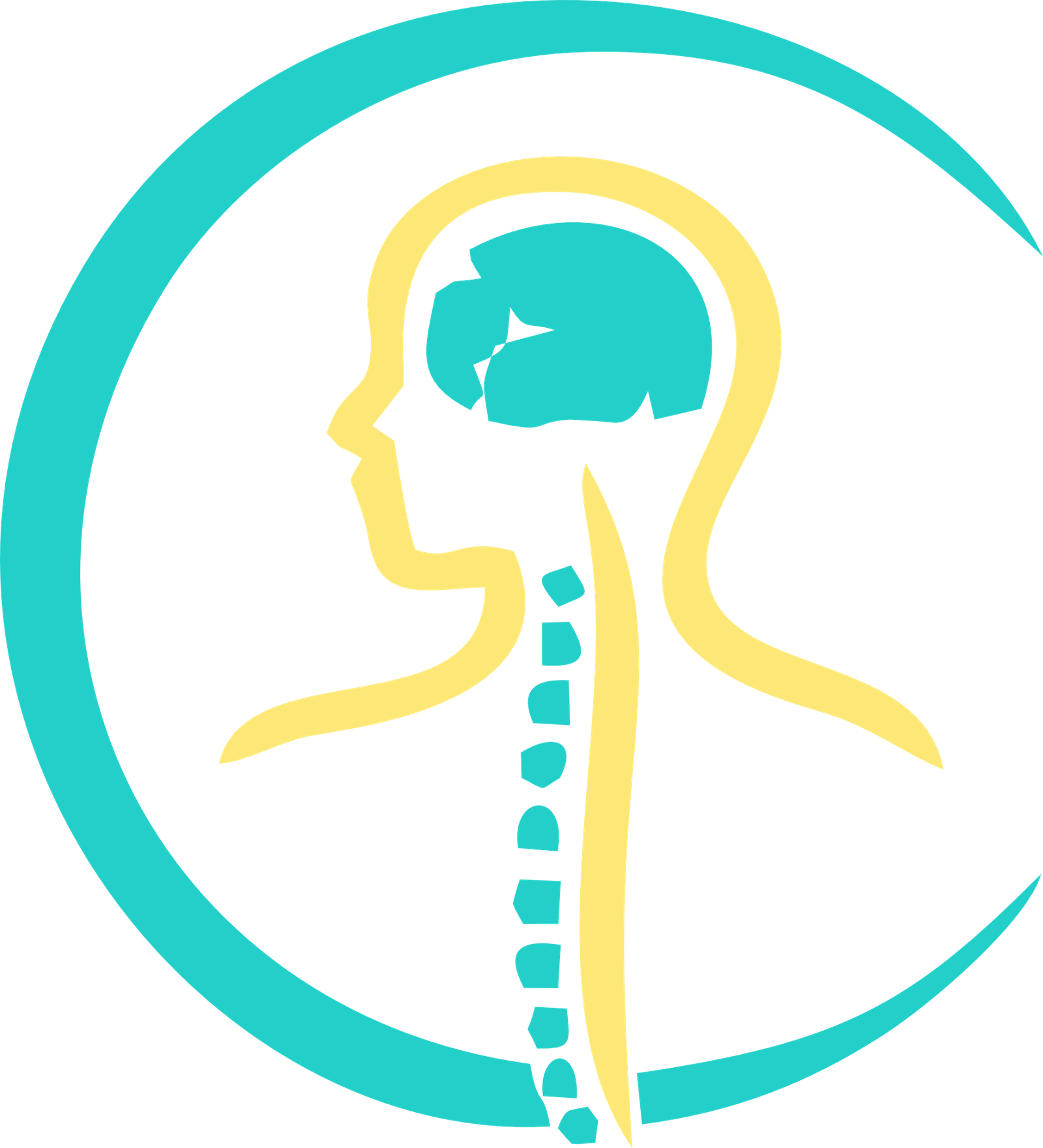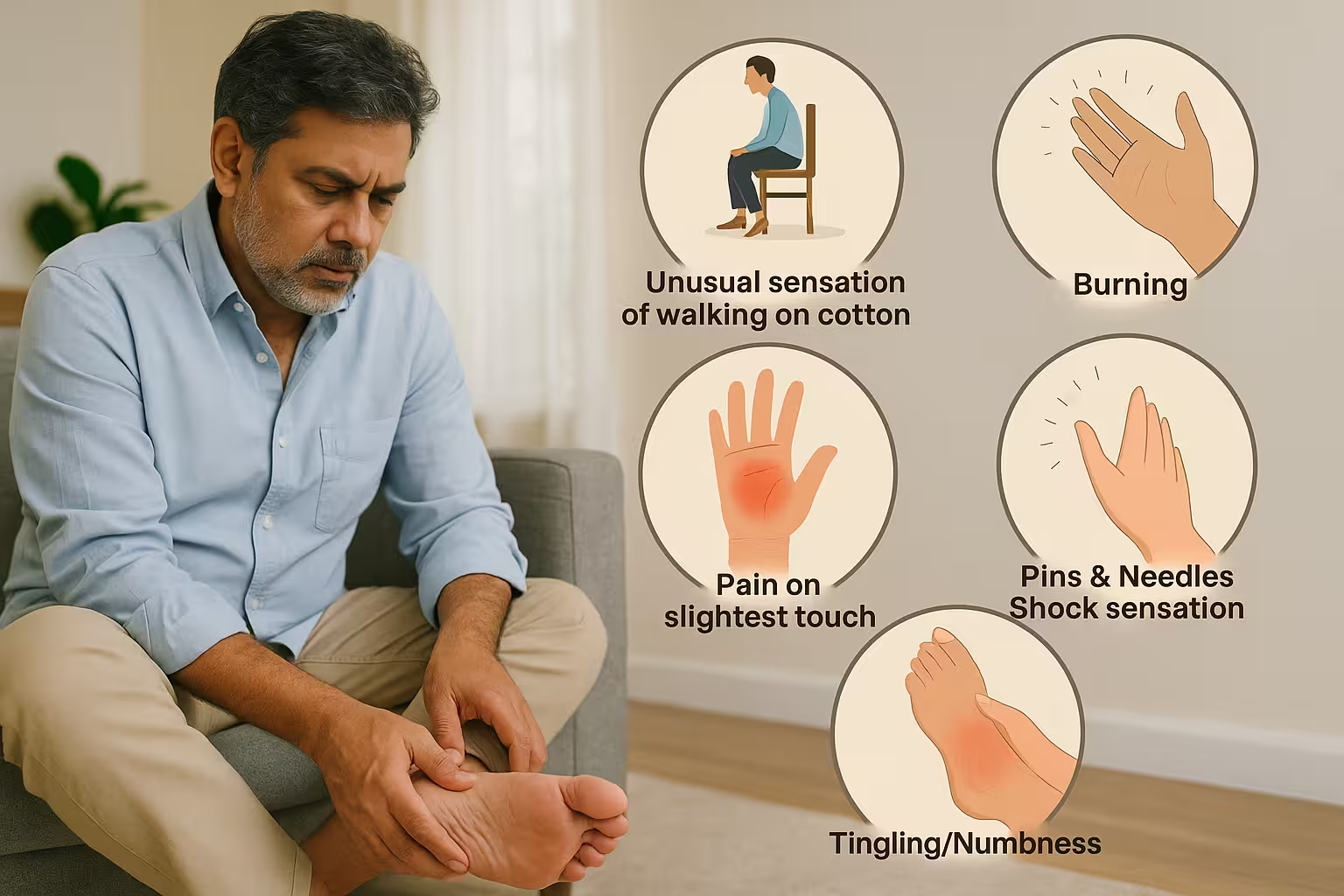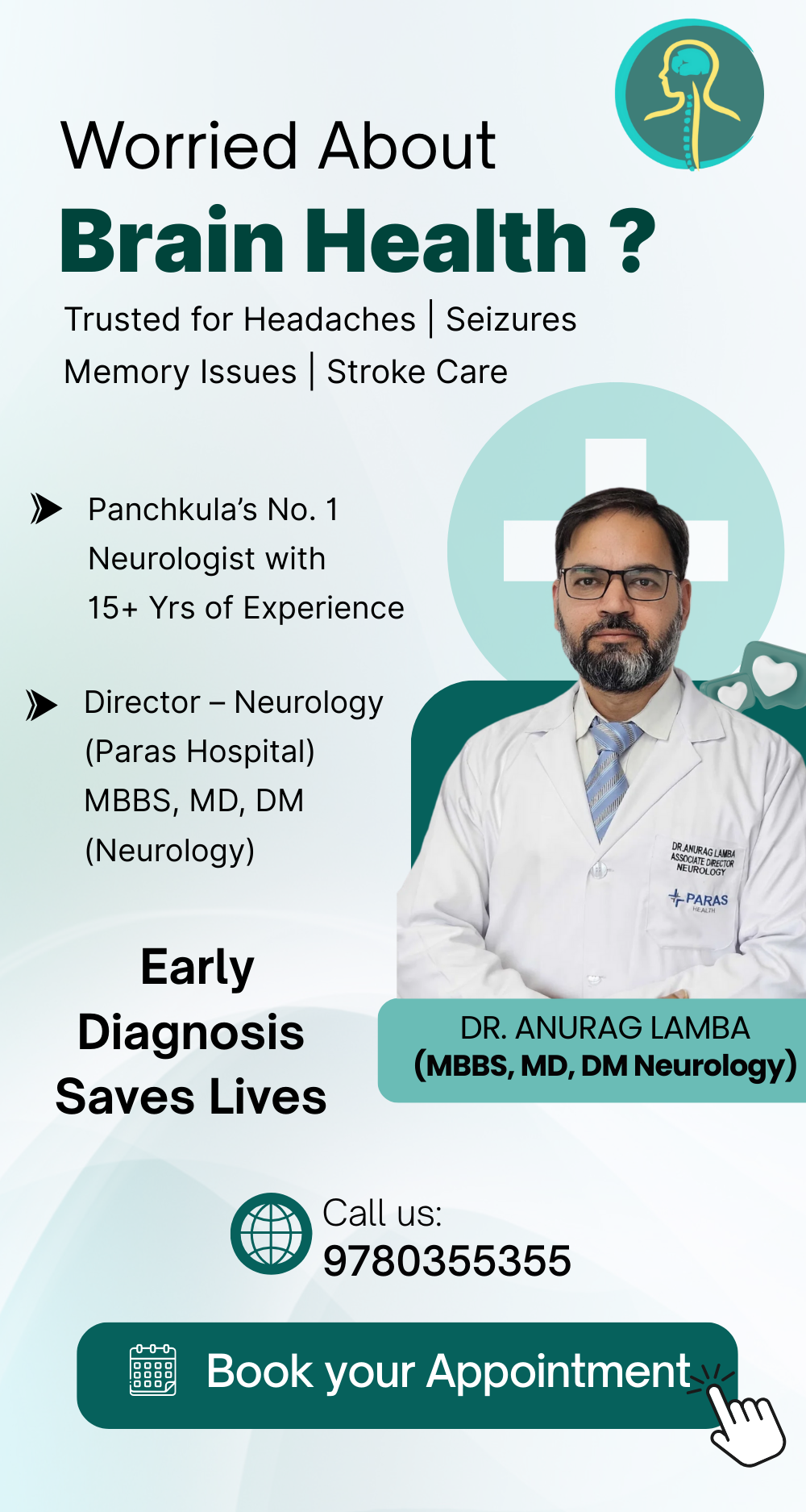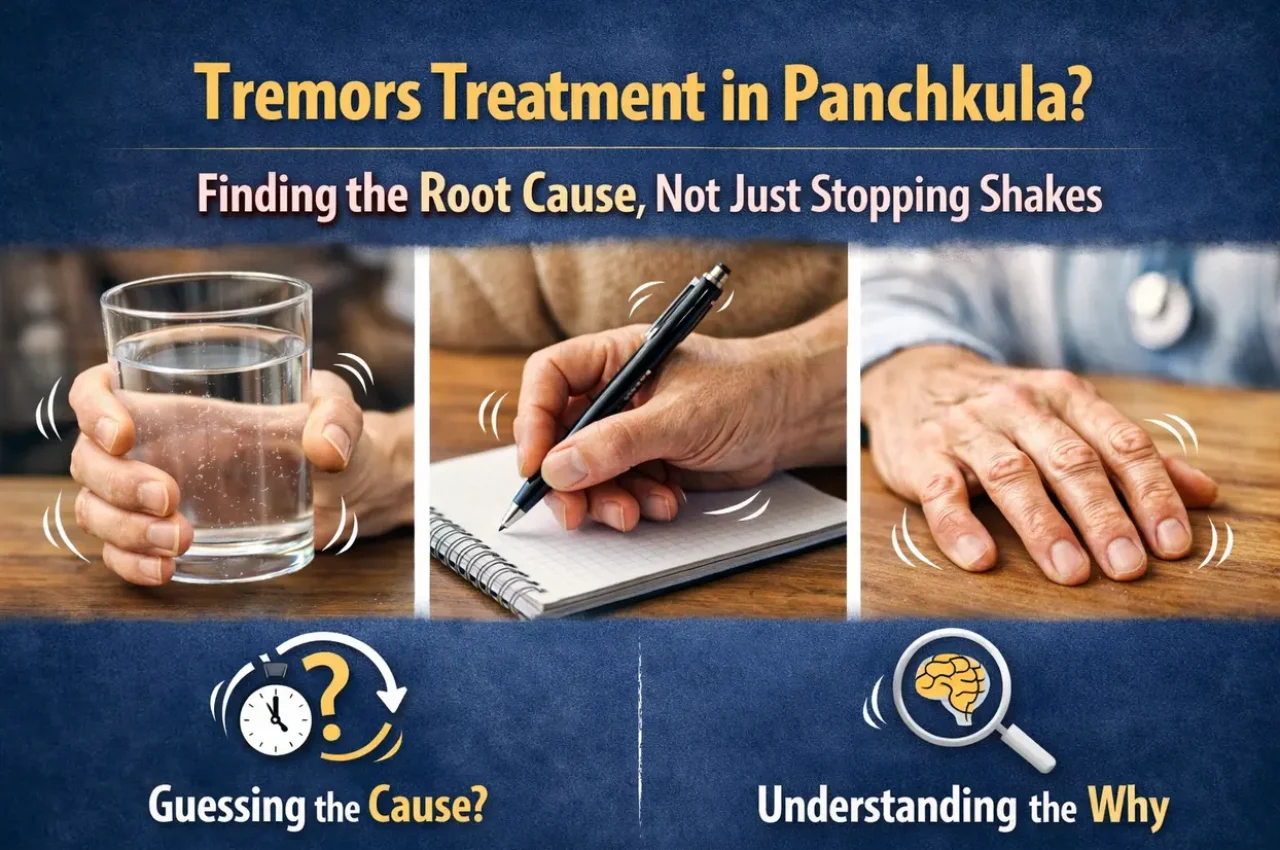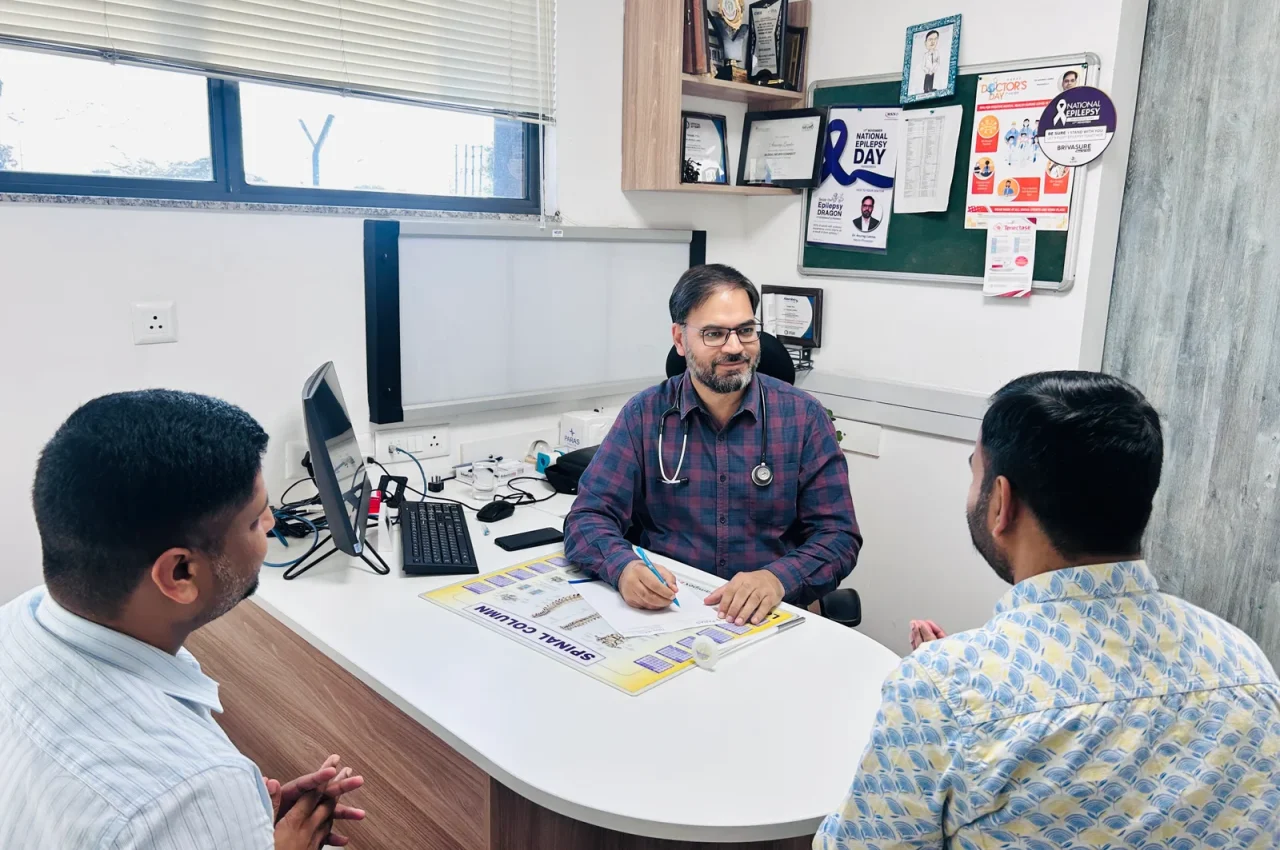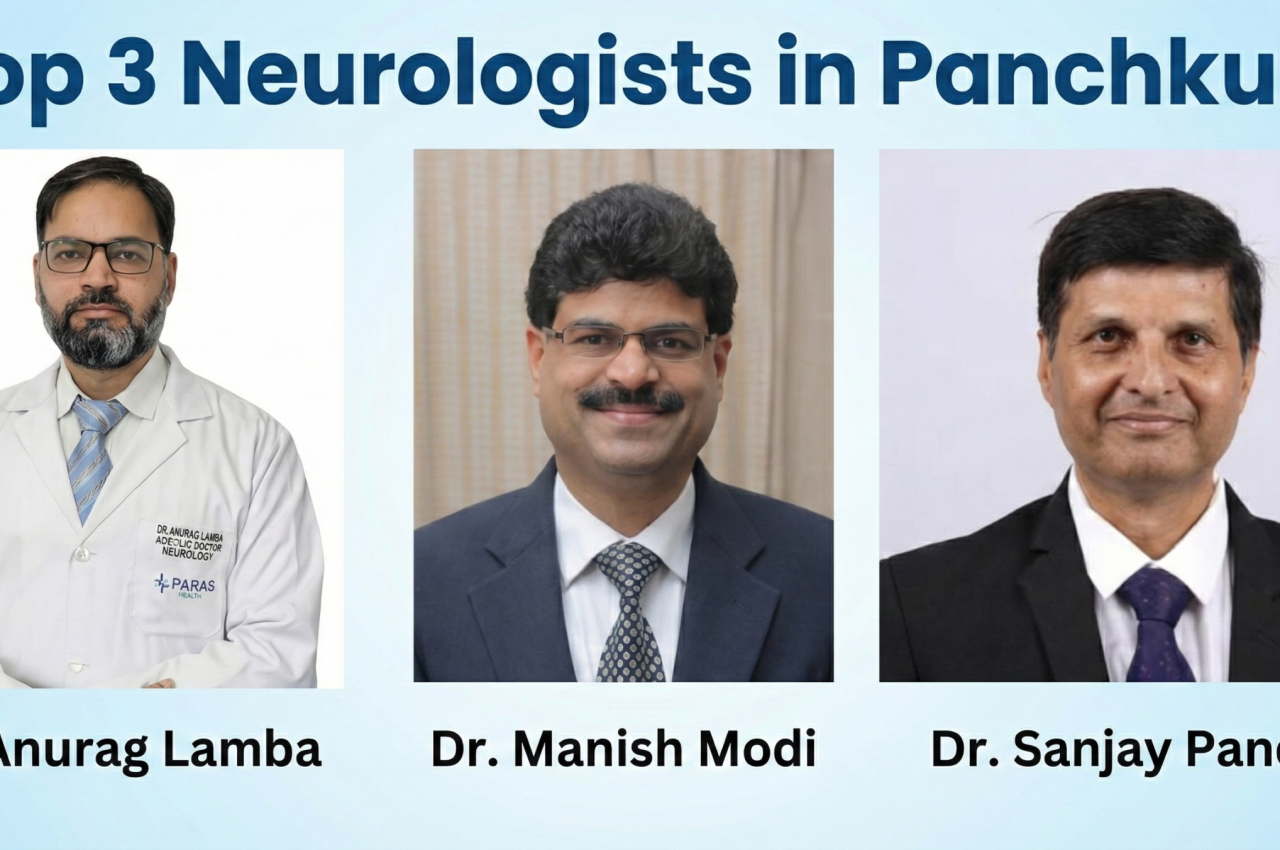Have you ever felt that weird tingling in your hands or feet that comes and goes? It feels like tiny pins poking under your skin or a faint buzzing under your toes. Most people ignore it, thinking it’s because they sat too long or slept in an odd position. But here’s the thing sometimes that small tingle is your body’s first warning that your nerves need attention. If you’ve ever wondered what tingling in your feet really means, you can read our detailed guide on Tingling in Your Feet: What It Really Means and When to Worry for a full breakdown.
The early signs of neuropathy Panchkula residents often experience don’t start with pain or big symptoms. Neuropathy begins quietly. Maybe it’s a light numbness in your feet, a weak grip, or a tingling that keeps showing up at night. If you’ve noticed any of these, don’t brush them off. They might be early nerve damage symptoms that slowly build up over time.
In Panchkula, more people are facing nerve-related issues because of diabetes, vitamin deficiencies, and long hours sitting at desks or standing at work. The good part? If you catch it early, neuropathy can often be slowed down or even reversed.
So, if you’ve been feeling tingling hands and feet, mild numbness in your feet, or that odd burning at night, take it as a sign to pause and pay attention. Your body might be trying to tell you something.
“Nerves rarely fail overnight. They give you quiet signs long before they shout.”
What Is Neuropathy and Why It Matters
Neuropathy means your nerves are struggling. They’re responsible for everything feeling touch, moving muscles, sensing temperature and when they get weak or damaged, those signals get confused. That’s when you start feeling tingling, numbness, or burning in your hands and feet.
This doesn’t happen suddenly. It builds slowly, sometimes over months or years. That’s why noticing the early signs of neuropathy in Panchkula is so important. Acting early can stop it from spreading and even help your nerves recover.
Understanding How Your Nerves Work
Your body has three main types of nerves:
- Sensory nerves help you feel things like heat, cold, and pain.
- Motor nerves control your muscles and movement.
- Autonomic nerves handle automatic actions like heartbeat and digestion.
When any of these nerves get weak, the messages between your brain and body don’t travel properly. You may feel:
- A light buzzing or vibration in your feet
- A sensation like walking on cotton or sand
- Sudden numbness in your toes or fingers
Healthy nerves act like clean electrical wires. When they wear down, those signals start misfiring, which causes that prickly or numb feeling.
Common Neuropathy Causes
There isn’t one single reason for neuropathy. It’s usually a mix of lifestyle and health factors.
Here are some common ones:
- Diabetes or high blood sugar, which slowly damages nerves
diabetic neuropathy is one of the most common complications of diabetes, affecting up to half of people with the condition during their lifetime.
- Vitamin deficiencies, especially B12 and D
- Spinal or nerve compression from long sitting hours or poor posture
- Alcohol or toxins, which can weaken nerves
- Thyroid or kidney issues, which affect nerve strength
In cities like Panchkula, many people spend long hours sitting or driving, and that reduces blood flow to nerves. Over time, this causes that mild tingling most people ignore until it becomes harder to reverse.
“Neuropathy doesn’t just happen. It builds slowly through small signals your body keeps sending until you finally pay attention.”
Early Signs of Neuropathy Panchkula Residents Should Watch Out For
Most people don’t think much about tingling or numbness until it starts interfering with daily life. But here’s the truth neuropathy doesn’t begin suddenly. It builds quietly through small signals your body sends every single day. If you’ve been feeling tingling hands and feet, burning at night, or numbness in your feet that doesn’t go away, it’s your body’s way of saying something’s not right.
The good news? You can do something about it especially if you catch it early. The early signs of neuropathy in Panchkula are easy to overlook, but that’s exactly when they’re easiest to treat. Whether it’s a vitamin deficiency, diabetes, or simple nerve stress from long sitting hours, early care can often reverse the damage before it becomes permanent.
Think of your nerves like electrical wires. When they’re well-protected and nourished, signals flow smoothly. But when the coating starts to wear out, the messages get weak or confused. That’s when you start feeling symptoms like tingling, numbness, or burning in your feet. The longer you wait, the harder it becomes to restore that connection.
So, if you’re noticing repeated tingling in your feet or mild nerve pain at night, don’t just ignore it or hope it goes away. Small steps today can prevent big problems tomorrow. Here’s what you can do right now:
- Track your symptoms when they start, how long they last, and what makes them worse.
- Eat foods rich in Vitamin B12, Vitamin D, and Omega-3 to strengthen your nerves.
- Move every hour, even for a few minutes, to keep blood flowing.
- If you have diabetes, manage your sugar levels carefully.
- Schedule a nerve check-up if the tingling or numbness lasts more than a few days.
In a growing city like Panchkula, where many of us spend long hours at desks or on our feet, these nerve damage symptoms are becoming common. But catching them early gives you control over your health and your comfort.
As per Johns Hopkins Medicine, early diagnosis and lifestyle management can significantly slow or even reverse peripheral neuropathy. That means the sooner you act, the better your chances of full recovery.
If you’re in Panchkula or nearby, consider booking a quick Nerve Conduction Test. It’s painless, takes only a few minutes, and can help your neurologist understand what’s happening with your nerves. You’ll get a clear picture whether it’s mild nerve compression, vitamin deficiency, or an early sign of neuropathy that needs treatment.
Your nerves are delicate but resilient. With the right nutrition, care, and attention, they can recover. Don’t wait for the tingling to turn into pain. Listen early, act early, and protect your nerve health today.
“Your body always whispers before it screams. Listening early makes all the difference.”
Why Early Detection of Neuropathy Is So Important
Neuropathy doesn’t appear overnight. It develops slowly which means if you catch it early, you can prevent serious damage.
How Early Treatment Prevents Long-Term Nerve Damage:
When diagnosed early, neuropathy can often be reversed. Vitamins, physiotherapy, or nerve therapy can help rebuild healthy nerve signals. Acting fast also prevents the condition from turning into chronic pain.
When Mild Tingling Turns Into Chronic Pain:
In the beginning, tingling feels mild. But over time, the signals turn into pain, burning, or electric shock-like sensations. Once that happens, recovery takes longer and becomes harder.
Local Case Example from Panchkula
A 44-year-old woman from Panchkula ignored her tingling for months. When it spread to her legs, she finally went for a Nerve Conduction Test. It showed early-stage neuropathy due to low Vitamin B12. With supplements and a few changes in diet, she improved within weeks.
Tests That Help Diagnose Neuropathy Early in Panchkula
If you’ve been feeling tingling or numbness frequently, a few quick tests can help confirm what’s going on.
Nerve Conduction Test and EMG
A Nerve Conduction Test checks how well your nerves carry signals. Small sensors are placed on your skin, and it’s completely painless. Sometimes, an EMG (Electromyography) is done to see how your muscles react to those signals.
Blood Tests for Vitamin and Sugar Levels
Low B12 or D levels are common reasons for tingling. A simple blood test can detect these early. Checking your blood sugar is also important since diabetes is one of the top causes of neuropathy.
According to the study, early detection through these tests can often reverse or manage neuropathy effectively.
How to Prevent or Slow Down Nerve Damage Naturally
Your nerves depend on good nutrition, oxygen, and rest. With a few small lifestyle changes, you can keep them healthy.
Nutrition and Vitamin-Rich Foods That Support Nerve Health
Include foods that nourish your nerves:
- Eggs, milk, fish, and cereals for Vitamin B12
- Mushrooms and sunlight exposure for Vitamin D
- Walnuts and flaxseeds for Omega-3 fats
- Spinach, almonds, and berries for antioxidants
- Plenty of water for hydration and blood flow
Daily Habits to Improve Blood Circulation and Reduce Nerve Stress
- Walk or stretch every hour if you sit for long periods
- Avoid tight shoes or clothes that limit circulation
- Quit smoking and reduce alcohol intake
- Try light yoga or meditation to ease tension
These small steps keep your blood flow active and your nerves healthy.
When Lifestyle Changes Aren’t Enough
If tingling or numbness still continues after improving your routine, see a neurologist. Sometimes the issue needs professional treatment before it becomes long-term.
When to See a Neurologist for Tingling or Numbness in Panchkula
Many people wait too long before consulting a doctor. But when it comes to nerves, early care makes recovery faster.
Red Flags That Mean You Shouldn’t Delay
- Tingling that lasts more than a week
- Weakness spreading to arms or legs
- Burning or pain at night
- Loss of balance or frequent tripping
If you notice two or more of these, it’s time to get checked.
How a Neurologist Identifies Early Neuropathy
The neurologist will check your symptoms and may suggest tests like:
- Nerve conduction study
- Vitamin and blood sugar levels
- Physical reflex checks
These tests are quick and painless but reveal a lot about your nerve health.
Conclusion: Don’t Ignore the Early Signs Protect Your Nerves Today
Nerve problems rarely begin with something dramatic. They start small maybe a faint tingling in your feet, a light burning at night, or numbness that feels easy to brush off. But here’s the thing, those tiny sensations often carry a bigger message. They’re the early signs of neuropathy Panchkula residents should take seriously before the nerves become permanently damaged.
When your nerves start acting up, it’s your body’s way of asking for care. The good part is, if you act early, nerve damage can often be slowed down or even reversed. A few simple lifestyle habits eating foods rich in Vitamin B12 and D, walking regularly, and staying hydrated can make a real difference. Pair that with early nerve testing, and you’ll know exactly where your nerve health stands.
If you’ve been feeling persistent tingling, burning, or numbness in your feet, don’t wait for it to pass. Early testing through a Nerve Conduction Test can identify problems long before they turn serious. If you’re in Panchkula or nearby, you can easily visit a neurology clinic to check your nerve health. Acting now could save you from years of discomfort later.
Your body always gives gentle hints before it starts shouting for help. Listen to those whispers your nerves are trying to tell you something. Taking care of them early doesn’t just protect your feet, it protects your peace of mind.

